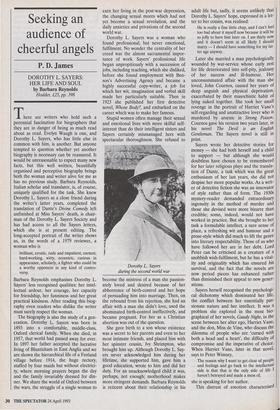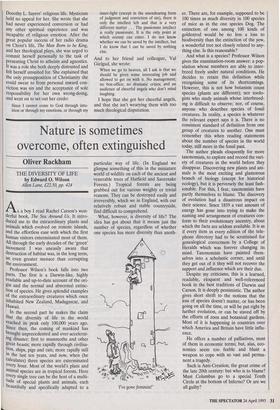Seeking an audience of cheerful angels
P. D. James
DOROTHY L. SAYERS: HER LIFE AND SOUL by Barbara Reynolds Hodder, 125, pp. 398 There are writers who hold such a perennial fascination for biographers that they are in danger of being as much read about as read. Evelyn Waugh is one, and Dorothy L. Sayers, who has little else in common with him, is another. But anyone tempted to question whether yet another biography is necessary can be reassured. It would be unreasonable to expect many new facts, but this well written, beautifully organised and perceptive biography brings both the woman and writer alive for me as has no previous study. Barbara Reynolds, Italian scholar and translator, is, of course, uniquely qualified for the task. She knew Dorothy L. Sayers as a close friend during the writer's latter years, completed the translation of Dante's Divine Comedy left unfinished at Miss Sayers' death, is chair- man of the Dorothy L. Sayers Society and has had access to all the Sayers letters, which she is at present editing. The long-accepted portrait of the writer shows us, in the words of a 1979 reviewer, a woman who is
brilliant, erratic, rude and impatient, earnest, hard-working, witty, eccentric, curious in appearance, scholarly, a fighter who could be a worthy opponent in any kind of contro- versy.
Barbara Reynolds emphasises Dorothy L. Sayers' less recognised qualities: her intel- lectual ardour, her courage, her capacity for friendship, her funniness and her great practical kindness. After reading this biog- raphy even readers who dislike the writer must surely respect the woman.
The biography is also the study of a gen- eration. Dorothy L. Sayers was born in 1893 into a comfortable, middle-class, Oxford clerical family. When she died, in 1957, that world had passed away for ever. In 1897 her father accepted the lucrative living of Bluntisham in East Anglia and we are shown the hierarchical life of a Fenland village before 1914, the huge rectory, staffed by four maids but without electrici- ty, where morning prayers began the day and the family invariably dressed for din- ner. We share the world of Oxford between the wars, the struggle of a single woman to earn her living in the post-war depression, the changing sexual mores which had not yet become a sexual revolution, and the daily anxieties and privations of the second world war.
Dorothy L. Sayers was a woman who found professional, but never emotional, fulfilment. No wonder the centrality of her creed was the almost sacramental impor- tance of work. Sayers' professional life began unpropitiously with a succession of jobs, including teaching, which she disliked, before she found employment with Ben- son's Advertising Agency and became a highly successful copy-writer, a job for which her wit, imagination and verbal skill made her particularly suitable. Then in 1923 she published her first detective novel, Whose Body?, and embarked on the career which was to make her famous.
Stupid women often manage their sexual and emotional lives with more skilful self- interest than do their intelligent sisters and Sayers certainly mismanaged hers with spectacular thoroughness. She refused to Dorothy L. Sayers during the second world war become the mistress of a man she passion- ately loved and desired because of her abhorrence of birth-control and her hope of persuading him into marriage. Then, on the rebound from his rejection, she had an affair with a man she didn't love, used the abominated birth-control ineffectively, and became pregnant. For her as a Christian abortion was out of the question.
She gave birth to a son whose existence was a secret to her parents and even to her most intimate friends, and placed him with her spinster cousin, Ivy Shrimpton, who brought him up. Although Dorothy L. Say- ers never acknowledged him during her lifetime, she supported him, gave him a good education, wrote to him and did her duty. For an unacknowledged child it was, perhaps, not enough; motherhood makes more stringent demands. Barbara Reynolds is reticent about their relationship in his adult life but, sadly, it seems unlikely that Dorothy L. Sayers' hope, expressed in a let- ter to her cousin, was realised:
He is really a fine little chap, and I can't feel too bad about it myself now because it will be so jolly to have him later on. I am thirty now and it doesn't seem at all likely I should marry — I should have something for my lat- ter age anyway.
Later she married a man psychologically wounded by war-service whose early zest for life deteriorated into self-pity, jealousy of her success and ill-humour. Her unconsummated affair with the man she loved, John Cournos, caused her years of deep anguish and physical deprivation, exacerbated by their masochistic habit of lying naked together. She took her small revenge in the portrait of Harriet Vane's self-regarding and unattractive lover who is murdered by arsenic in Strong Poison. Cournos gave his version two years later, in his novel The Devil is an English Gentleman. The Sayers novel is still in print.
Sayers wrote her detective stories for money — she had both herself and a child to support — but although she would doubtless have chosen to be remembered for her later religious plays and the transla- tion of Dante, a task which was the great enthusiasm of her last years, she did not despise her more popular works. As a writ- er of detective fiction she was an innovator of style rather than of form. The 1930s mystery-reader demanded extraordinary ingenuity in the method of murder and those she devised were more bizarre than credible; some, indeed, would not have worked in practice. But she brought to her task a formidable intellect, a sure sense of place, a refreshing wit and humour and a prose-style which did much to lift the genre into literary respectability. Those of us who have followed her are in her debt. Lord Peter can be criticised as a creature of a snobbish wish-fulfilment, but he has a vital- ity and originality which has ensured his survival, and the fact that the novels are now period pieces has enhanced rather than diminished their appeal to new gener- ations.
Sayers herself recognised the psychologi- cal dichotomy which dominated her life, the conflict between her essentially pas- sionate nature and her intellect. It was a problem she explored in the most bio- graphical of her novels, Gaudy Night, in the scene between her alter ego, Harriet Vane, and the don, Miss de Vine, who discuss the dilemma of people who are 'cursed with both a head and a heart', the difficulty of compromise and the imperative of choice. When Harriet Vane, later in that novel, says to Peter Wimsey, The reason why I want to get clear of people and feelings and go back to the intellectual side is that that is the only side of life I haven't betrayed and made a mess of, she is speaking for her author. This distrust of emotion characterised Dorothy L. Sayers' religious life. Mysticism held no appeal for her. She wrote that she had never experienced conversion or had any other spiritual experience and was incapable of religious emotion. After the great popular success of her radio drama on Christ's life, The Man Born to be King, and her theological plays, she was urged to commit herself personally to the task of Presenting Christ to atheists and agnostics. It was a role she both deeply distrusted and felt herself unsuited for. She explained that the only presupposition of Christianity she could swear to from personal inward con- viction was sin and the acceptance of sole responsibility for her own wrong-doing, and went on to set out her credo:
Since I cannot come to God through intu- ition or through my emotions, or through my inner-light (except in the unendearing form of judgment and conviction of sin), there is only the intellect left and that is a very different matter . . . The passionate intellect is really passionate. It is the only point at which ecstasy can enter. I do not know whether we can be saved by the intellect, but I do know that I can be saved by nothing else.
And to her friend and colleague, Val Gielgud, she wrote:
When we go to heaven, all I ask is that we should be given some interesting job and allowed to get on with it. No management; no box-office; no dramatic critics; and an audience of cheerful angels who don't mind laughing.
I hope that she got her cheerful angels, and that she isn't wearying them with too much theological disputation.



























































 Previous page
Previous page